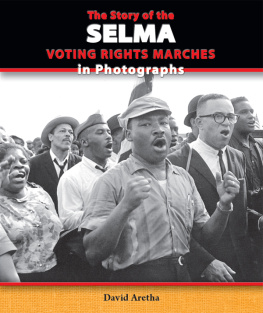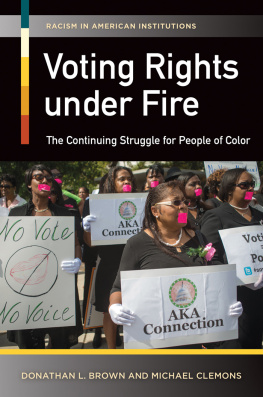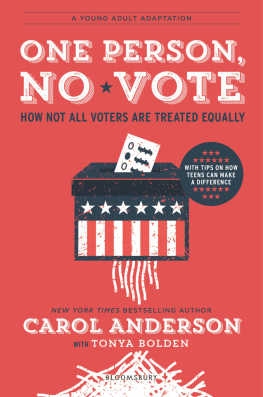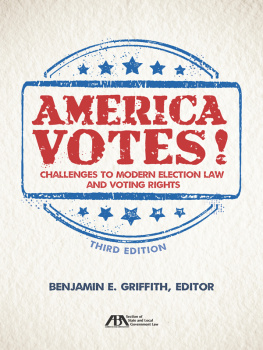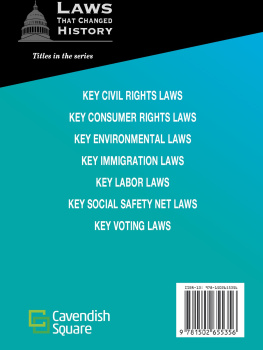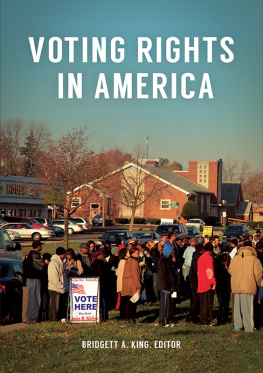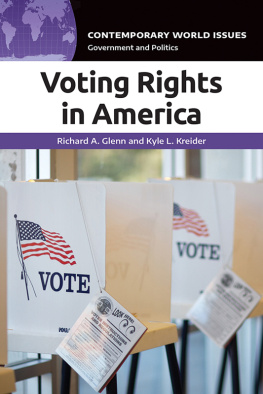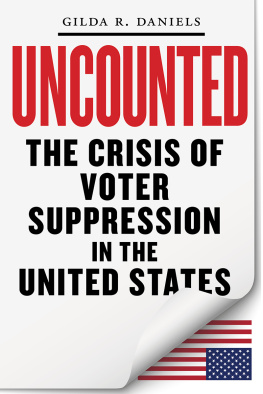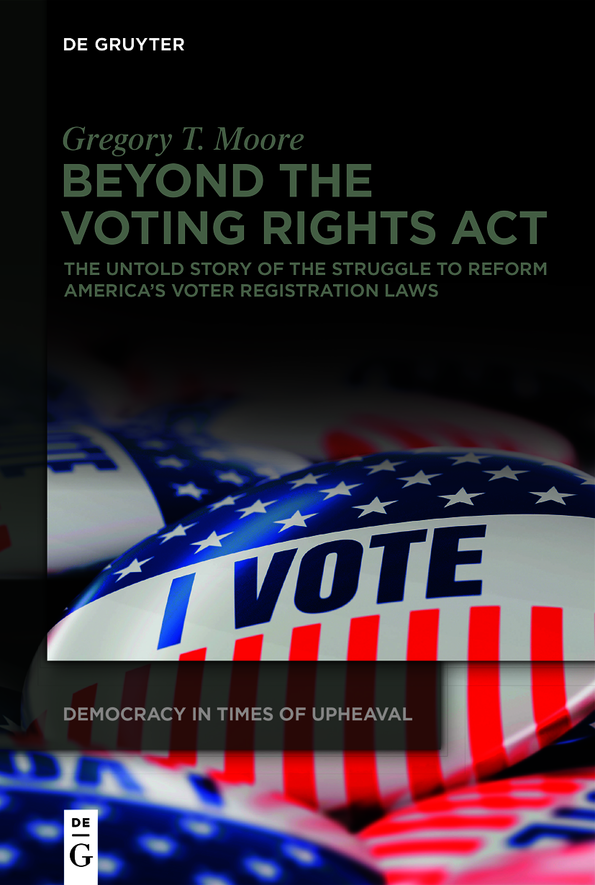Democracy in Times of Upheaval
Edited by
Matt Qvortrup
Volume
ISBN 9783110782738
e-ISBN (PDF) 9783110742473
e-ISBN (EPUB) 9783110742565
Bibliographic information published by the Deutsche Nationalbibliothek
The Deutsche Nationalbibliothek lists this publication in the Deutsche Nationalbibliografie; detailed bibliographic data are available on the Internet at http://dnb.dnb.de.
2022 Walter de Gruyter GmbH, Berlin/Boston
This book is dedicated to the memory of Bernice Moore, Lanie Moore, Sr., Marilyn Moore Hardy, Lanie Moore, Jr., and my many other family and friends who have departed this earth and contributed to my spiritual, personal, and professional development as a voting rights advocate.
Acknowledgements
The combination of legislative reforms and voter mobilizations recounted in this book were undertaken by a wide spectrum of advocates, organizations, contributors, and coalitions that are too numerous to name here. However, I would like to sincerely thank all those persons and entities referenced below for their longstanding contributions to the struggle for voter reforms highlighted in this bookand to the expansion of our democracy overall.
First and foremost, I want to acknowledge the arduous work and commitment of the Motor Voter Coalition, made up of over thirty organizations who worked for over 4 years to pass the landmark National Voter Registration Act of 1993, (NVRA). While the coalition received little notoriety, it was effective in plowing through years of partisan gridlock and resistance on Capitol Hill to pass one of the most comprehensive voter reform bills in US History. The original members of the Motor Voter Coalition included: The League of Women Voters, the NAACP, the Leadership Conference on Civil and Human Rights, the NAACP Legal Defense and Education Fund, the American Civil Liberties Union the Lawyers Committee for Civil Rights Under Law, ACORN, Project Vote, Human Serve, People for the American Way, the Citizenship Education Fund and Rainbow/Push Coalition, the Center on Policy Alternatives, the AFL-CIO, the National Coalition on Black Civic Participation, the A. Phillip Randolph Institute, the National Urban League, the Mexican American Legal Defense and Education Fund, the United States Student Association, Disabled Veterans of America, Black Veterans of America, Disabled-But Able to Vote, Rock the Vote, Common Cause, the US Public Interest Research Group, the Midwest and Southwest Voter Registration Projects, the Committee for the Study of the Electorate, the Center for Constitutional Rights, the American Jewish Committee, the League of United Latin American Citizens, the National Disabilities Rights Network, the Paralyzed Veterans of America, and the United Methodist Church-General Board of Church and Society.
After NVRAs passage, there were major institutions and organizations who undertook research and analysis of the NVRAs impact in the years after its passage. Within the federal government, the U.S. Election Assistance Commission, and Department of Justice led the oversite and enforcement respectfully. Among the leading advocacy groups were DEMOS, the Advancement Project, Pew Charitable Trust, Project Vote, the Brennen Center for Justice at NYU, the ACLU, the NAACP LDF, the Mexican American Legal Defense and Education Fund, the Democracy Fund and scores of foundations and advocacy organizations. Without their constant monitoring and fierce advocacy of NVRAs full implementation and enforcement, the laws impact would have been greatly diminished.
Many prominent members of the civil rights, labor, faith-based and human rights community played a significant role behind the scenes to advance NVRA and the many voting rights crusades highlighted in this book. They include Motor Voter Co-chairs NAACP Attorney Eddie Hailes and League of Women Voters, lobbyists Mary Brooks and Lloyd Leonard; Human Serve leaders Richard Cloward and Francis Fox-Piven, JoAnne Chasnow, and Hulbert James; Disability Activists Jim Dixon and Justin Dart; Mort Halpern, Judy Goldberg-Crockett, and Laura Murphy Lee of the ACLU; Elaine Jones, Penda Hair, Lani Gunier, Ted Shaw, Judith Brown-Dianis NAACP-LDF, longtime NAACP Washington Bureau Chief Hillary Shelton, the Advancement Projects the National Coalition on Black Civic Participations Directors Gracia Hillman, Atty. Sonya Jarvis, and Melanie Campbell; Marsha Adler and Melanne Verveer with People for the American Way; Wallace Williams, with Black Veterans of America, the Mexican American Legal Defense Funds Steve Carbo, DEMOS founder and former Connecticut Secretary of State Miles Rappaport, National Urban Leagues Bob McAlpine, and Ron Jackson; Patrick Lippert and Steve Barr with Rock the Vote; Mary Francis Berry, U.S. Commission on Civil Rights; Ralph Neas, Wade Henderson, Gene Karpinski, U.S. Public Interest Research Group, Nancy Zirkin, Bill Taylor and Ellen Buchman with the Leadership Conference on Civil and Human Rights.
The NVRA could not have been enacted into law without key Congresspersons and congressional staffers. They include the NVRA lead sponsors, Congressman Al Swifts staffers Karl Sandstorm, Herb Stone; Rules Committee Chairman Wendall Ford and lead counsel Jack Sousa; House Judiciary Committees Chairman and NVRA co-sponsor Congressman John Conyers, Jr.; Staff Directors Julian Epstein, Perry Applebaum, and Committee Counselors Ron Stroman, Keenan Keller, Ted Kalo, and Stephanie Moore; House Leadership staff Lorraine Miller, Steve Chapman, and Cassandra Butts. Special recognition must be given to Republican Members of Congress and their staff who supported voter reform in defiance of their party leadership: Representatives Bill Thomas and Jim Sensenbrenner; and Senators Mark Hatfield, Jim Jeffords, and Dave Durenberger in the Senate.
Finally, I want to pay tribute to many of the fallen warriors who were champions of the NVRA and have left their indelible mark on our nations voting rights history. They include Althea Simmons, of the NAACP, Professor Richard Cloward, a pioneer of agency based voter registration; Attorney Frank Parker, Lawyers Committee for Civil Rights Under Law; Ron Brown, the first Black Democratic National Committee Chairman; Patrick Lippert of Rock the Vote; Willie Velasquez and Antonio Gonzales of the Southwest Voter Registration Project; Attorneys Lani Gunier and Counsel Director Julius Chambers with the NAACP-LDF; Curtis Gans with the Committee for the Study of the Electorate; and Equal Employment Opportunity Commission Chairperson Jaqueline Berrien. In the US Congress, Representatives John Conyers, Jr. Al Swift, John Lewis, Bill Gray, Stephanie-Tubbs Jones; and Senators Wendall Ford, Mark Hatfield, and Paul Wellstone in the US Senate.
And finally, a special thank you to the editors and production crew at De Gruyter Publishing: Matt Qvortrup who first invited me to be part of the Democracy in Times of Upheaval series, Michaela Gbels, Gerhard Boomgaarden and Katharina Ehlgen who guided this manuscript to its final edits and production. Thank you for your patience and your continued encouragement to bring this decades long research and writing project to fruition. Special thanks to Shelly Wilsey who led me to the ILA international convening and Matt Qvortrup. Thanks to Jennifer Lawrence and copy editors at American Manuscript Editors; to Anitra Merritt and Dr. Denise Wright for the initial word processing and research of my earlier manuscript drafts. Thanks to the academics, peer reviewers, researchers and readers who critiqued multiple versions of the manuscript including: led by my devoted wife and life partner Jean (JB) Moore who has been by my side during much of this journey, Dr. David Descutner, Gillian Berchowitz and Richard Hurd of Ohio University Press; Professor James Steele, Medgar Evers College, (CUNY), Dr. Keith Jennings, Atlanta-Clark University; Dr. Carl Levan, American University, and Dr. Clarence Lusane, Howard University. My sincere thanks to all the above for your commitment to expanding the right to vote and for making this book possible. Most importantly I want to thank God for allowing me to be a part of and bear witness to all of the historical experiences detailed in this book.


